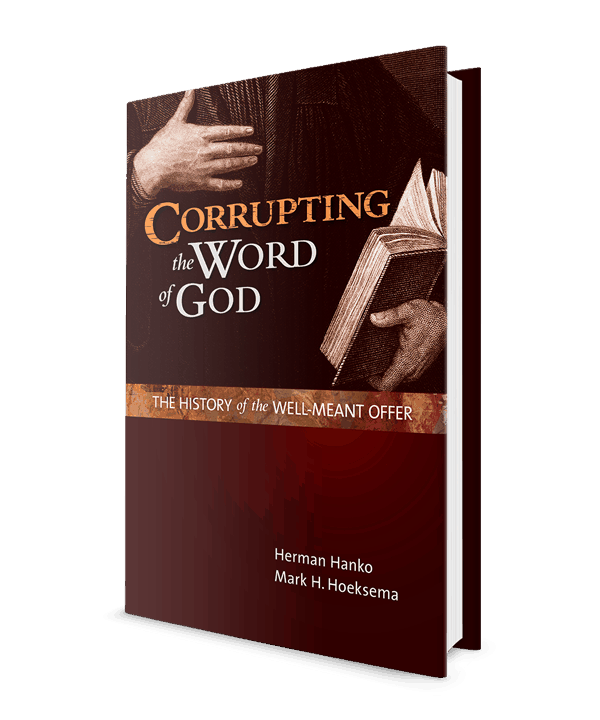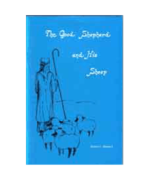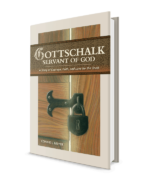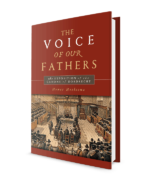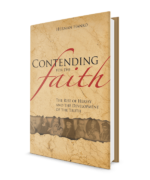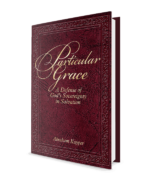Does the eternal, unchangeable, all-powerful, and sovereign God really have a temporal, changeable and weak desire to save those whom He has unconditionally reprobated (Rom. 9:22), for whom the Son did not die (John 12:31) and whom the Holy Spirit will not regenerate, sanctify or glorify (John 3:8)?
Pelagianism, Semi-Pelagianism, Roman Catholicism, Lutheranism, Anabaptism, Arminianism, Amyraldianism and Marrowism say yes to the well-meant offer of the gospel. The biblical, Augustinian, Reformed and creedal position is no!
Emeritus professor of church history, Herman Hanko, guides us through fascinating doctrinal controversies in the early, Reformation and modern eras of the church, taking us to North Africa, Switzerland, France, England, Scotland, the Netherlands and America, and emphasizing the teaching of the great theologians, such as Augustine and John Calvin, on God’s particular grace, which is always irresistible and never fails or is frustrated.
In dealing with the historical perspective of God’s absolutely sovereign grace versus the well-meant offer, this book fills a gap in the literature, and does so in a way that is warm and easily understood.
An earlier version of this book can be read on-line.
For an excerpt of this book in Spanish, click here.
“Biblical Calvinism has been so diluted it’s amazing so many have the audacity to claim they are Reformed.” – S. Wales
“Excellent, excellent book!” – North Carolina, USA
“I’m enjoying Corrupting the Word of God by Hanko. Packed with useful material.” – England
Select Annotated Bibliography
1) Augustine, The Enchiridion on Faith, Hope and Love, ed. Henry Paolucci, trans. J. F. Shaw (Chicago, IL: Henry Regnery Co., 1961). Augustine of Hippo (354-430) in North Africa was undoubtedly the greatest theologian of the early church. Toward the end of his eventful life, he wrote a handbook for a Roman called Laurentius, summarizing the Christian faith around the three theological virtues (faith, hope and love) and the Apostles’ Creed. This work, which has been very popular in the church’s history, contains a lengthy section (xciv-cvii) on eternal election and reprobation, and God’s omnipotence and immutability, which sharply opposes the free offer and its misinterpretation of I Timothy 2:4 and Matthew 23:37, in the light of Scripture (esp. Ps. 115:3; 135:6; Rom. 9).1
2) Francis X. Gumerlock, Fulgentius of Ruspe on the Saving Will of God: The Development of a Sixth-Century African Bishop’s Interpretation of I Timothy 2:4 During the Semi-Pelagian Controversy (Lewiston, NY: Edwin Mellen Press, 2009). In 520, Fulgentius of Ruspe (468-533) wrote a synodal letter, in the name of his fifteen fellow North African bishops (who were banished by the Vandals to Sardinia), opposing the well-meant-offer views of the Semi-Pelagian monks in Constantinople. Gumerlock’s fascinating book traces the development of Fulgentius’ views through several stages until he confessed the full Augustinian position and embraced the predestinarian understanding of Matthew 23:37, I Timothy 2:4 and II Peter 3:9.
3) Victor Genke and Francis X. Gumerlock (eds. & trans.), Gottschalk and a Medieval Predestination Controversy: Texts Translated From the Latin (Milwaukee, WI: Marquette University Press, 2010). Saxon monk and missionary to Croatia and Bulgaria, Gottschalk of Orbais (c.808-c.867) was even more forceful and antithetical than Augustine on Christ’s particular atonement and God’s effectual saving desire, occasioning the biggest theological controversy of the ninth century, involving several councils, the leading churchmen of Western Europe and even the successors of Emperor Charlemagne: his son and grandsons. For his stand for the truth, confessor Gottschalk was excommunicated, brutally flogged on two occasions and placed under house arrest, dying after twenty years in captivity. This recent book contains many excellent writings of Gottschalk never before published in English.
4) John Calvin, Calvin’s Calvinism (Jenison, MI: RFPA, 2009). This superb publication contains the French Reformer’s fullest and most detailed treatment of God’s eternal predestination over against several Roman Catholic theologians, who argue that God desires to convert everybody, appealing to the usual texts, especially I Timothy 2:4, on which Calvin (1509-1564) faithfully follows the Augustinian exegesis. Part one of this book, God’s Eternal Predestination and Secret Providence or the Consensus Genevensis (1552), its longest section, was sent forth with the consent of Geneva’s Venerable Company of Pastors.2
5) Jonathan Rainbow, The Will of God and the Cross: An Historical and Theological Study of John Calvin’s Doctrine of Limited Redemption (Eugene, OR: Pickwick Publications, 1990). In this powerful work, Rainbow convincingly demonstrates that Calvin stands in the line of Augustine of Hippo, Fulgentius of Ruspe, Gottschalk of Orbais and others, including the Strasbourg Reformer Martin Bucer (1491-1551), on Christ’s particular atonement and God’s saving will towards His elect alone.
6) John Knox, On Predestination, in Answer to the Cavillations by an Anabaptist (1560), in The Works of John Knox, ed. David Laing (USA: Banner, 2014), vol. 5, pp. 7-468. In his longest and most profound theological work, John Knox (c.1514-1572) establishes the absolute sovereignty of God from Scripture, with frequent appeals to Augustine (including his Enchiridion), Calvin (including his Consensus Genevensis) and Theodore Beza (1519-1605). When his English Anabaptist opponent argued from the four frequently cited texts (see below) for a desire of God to save the reprobate, Scotland’s greatest Reformer successfully refuted him on all of them.3
7) Pierre du Moulin, Anatomie of Arminianism (London: T. S. for Nathaniel Newbery, 1620). Du Moulin (1568–1658) was one of the four representatives delegated by the French Reformed Church to the great Synod of Dordt (1618-1619) but was forbidden to go by King Louis XIII under pain of death. In writing against the doctrines of the Arminians, du Moulin strongly opposed their notion that God wishes to save everyone.4
8) Jonathan Moore, English Hypothetical Universalism: John Preston and the Softening of Reformed Theology (Grand Rapids, MI: Eerdmans, 2007). In setting forth the free-offer theology of John Preston (1587-1628) regarding the divine decree, the death of Christ and the gospel call, Moore explains how it was a watering down of the solid Elizabethan particularism of John Bridges (1536–1618), William Perkins (1558-1602) and John Dove (1561-1618) in Puritan England, as well as being contrary to such continental Reformed worthies as Theodore Beza in Geneva, and Jacobus Kimedoncius (c.1550-1596) and Jeremias Bastingius (1551-1595) in Heidelberg.
9) The Geneva Theses (1649), in James T. Dennison, Jr. (ed.), Reformed Confessions of the 16th and 17th Centuries in English Translation, vol. 4 (Grand Rapids, MI: Reformation Heritage Books, 2014), pp. 413-422. This binding confession from Calvin’s citadel explicitly and repeatedly rejects the free-offer view of God’s will and love as taught by the Amyraldians, and opposes their interpretation of Ezekiel 18:21ff. and 33:11, I Timothy 2:4 and II Peter 3:9. The two pastors and theological professors who drafted the Geneva Theses were Antoine Léger (1594-1661) and Théodore Tronchin (1582-1657), who was a Genevan delegate at the Synod of Dordt which condemned Arminianism.5
10) David J. Engelsma, Hyper-Calvinism and the Call of the Gospel: An Examination of the Well-Meant Offer of the Gospel (Jenison, MI: RFPA, 2014). Though this book is mainly a theological and biblical refutation of the free offer, it does treat historical aspects of the issue, including, for example, the English hyper-Calvinists in the eighteenth century, Dutch secession theologians in the nineteenth century and developments in twentieth-century North American churches, especially the Christian Reformed Church and the Orthodox Presbyterian Church. It also contains chapters on the sound teaching on the gospel call by John Calvin, Francis Turretin and Abraham Kuyper (1837-1920).
The Four Main Texts Wrongly Appealed to as if They Taught the Well-Meant Offer
Besides the authorities from various ages and countries mentioned above (including Augustine, Fulgentius, Gottschalk, Calvin, Knox, Beza, Bridges, Kimedoncius, Bastingius, Perkins, Dove, du Moulin, the Geneva Theses, Turretin, Gernler, Heidegger, Kuyper, Rainbow, Engelsma and Moore), quotes from and about other theologians, who do not interpret the four main texts urged by free-offer advocates as if they support a (temporal and failed) desire of God to save the reprobate, have been compiled on-line.6
1) I Timothy 2:4, includes Januarius, Caesarius of Arles, Students of Cassiodorus (sixth century), an old Irish gloss (c. 700), Sedulius Scottus, Florus of Lyon, Prudentius of Troyes, Servatus Lupus, Ratramnus of Corbie, Remigius of Lyon, Hugh of St. Victor, Peter Lombard, Bonaventure, Thomas Aquinas, Duns Scotus, Thomas Bradwardine, Gregory of Rimini, John Wycliffe, Laurenzo Valla, Martin Bucer, Jerome Zanchius, Zacharias Ursinus, Daniel Tossanus, William Ames, Jacobus Trigland, Thomas Watson, Herman Witsius, Bernardinus de Moor, Johann van den Honert, Hendrik de Cock, William Cunningham, George Smeaton, Lorraine Boettner, John W. Robbins, Peter Barnes, etc.7
Apart from the worthies mentioned in the select bibliography and in connection with I Timothy 2:4 (above), the text upon which the free-offer debate has focussed historically, quotes from other theologians are also given regarding the three remaining scriptural passages below.
2) Ezekiel 18:23, 32 and 33:11, includes Wilhelmus à Brakel, James Henley Thornwell, John Kennedy of Dingwall, Herman Hoeksema, John H. Gerstner, Richard A. Muller, John Bolt, Christopher J. Connors, Raymond A. Blacketer, Sean Gerety, etc.8
3) Matthew 23:37 and Luke 13:34, includes Peter Martyr Vermigli, John Owen, Christopher Ness, Peter Nahuys, John Gill, William Young, Richard Bacon, W. Gary Crampton, James R. Whyte, Matthew Winzer, James Gracie, Vincent Cheung, etc.9
4) II Peter 3:9, includes the Venerable Bede, the Geneva Bible (1599), the Confession of Tarcal (1562) and Torda (1563), David Dickson, Stephen Charnock, Matthew Henry, Thomas E. Peck, A. W. Pink, Gordon H. Clark, Robert L. Reymond, R. C. Sproul, etc.10

